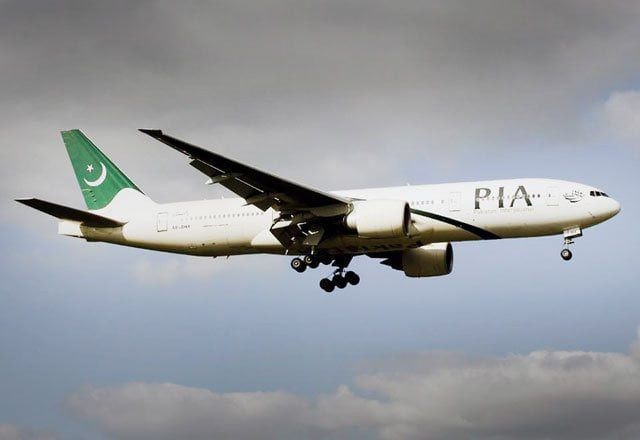‘Emirates, Etihad Airways showed interest in buying PIA stake’
Official close to privatisation developments says govt has failed to complete its sell-off agenda

Official close to privatisation developments says govt has failed to complete its sell-off agenda. PHOTO COURTESY: PIA
After earning a substantial $1.72 billion under its ambitious privatisation plan in the first two years, the PML-N’s sell-off programme stalled in the latter half of its tenure. The tactical retreat came as protests erupted after it was reported that the government was considering selling its stake in the national carrier.
“The Privatisation Commission found potential strategic buyers for two top loss-making state-owned entities; PIA and Pakistan Steel Mills,” an official told The Express Tribune on Saturday.
“Emirates and Etihad Airways were showing great interest in PIA,” he said.
In the past two years, despite repeated claims of restructuring and eventually selling stakes in loss-making entities, not a single privatisation transaction has occurred.
Instead, Pakistan’s taxpayers have had to bear the brunt of coughing up Rs500 billion as loss-making enterprises continue to be a strain on the country’s fiscal operations. In addition, these companies have not gone through the restructuring process that was touted before the government was elected into power.
One of the top agendas of the International Monetary Fund (IMF) programme, under which Pakistan got a $6.2-billion bailout, was to restructure and/or sell stakes in loss-making state-owned entities.
While the government succeeded in selling stakes in some entities - such as Habib Bank Limited and United Bank Limited - its plan to sell the troubled PIA and PSM hit snags at multiple steps.
In PIA’s case, protests erupted at the privatisation plan that resulted in one death in January 2016.
Flights also faced delays over the course of the three-day eruption. “If it were privatised at the time (2016), PIA would have been on its way to recovery now,” said the official.
The government, however, has now made it clear that PIA’s privatisation would not be pursued anymore. Instead, it would be restructured though it still remains part of the official list of the Privatisation Commission.
“Whenever the government gives a green signal, the process would resume from there,” he said.
PSM’s case
The official said the case of PSM is also similar. “The Sindh government did not want to take over the PSM, nor did it want to sell it.
“Political parties vehemently opposed the privatisation programme for point-scoring and for saving their vote banks. If PML-N had been in opposition, it would have done the same thing that Pakistan Peoples Party and Pakistan Tehreek-e-Insaf did,” he said.
“The government’s full-time engagement in defending itself in the Panama case left no time for crucial economic decisions. Ditching the planned privatisation agenda is part of the failed economic decisions.”
Last transaction in 2015
The government completed its last privatisation transaction of National Power Construction Corporation (NPCC) in August 2015 through which it sold 88% shares for Rs2.5 billion to a Saudi company - Mansour Al Mosaid Limited.
The government has so far completed only five privatisation transactions, including four through public offerings at the Pakistan Stock Exchange, out of a total of 69 transactions on its priority list.
The five transactions earned privatisation proceeds of $1.72 billion during 2013-2015. This figures includes the $1.12 billion it attracted in foreign exchange reserves, according to the Privatisation Commission.
Published in The Express Tribune, January 14th, 2018.
Like Business on Facebook, follow @TribuneBiz on Twitter to stay informed and join in the conversation.



















COMMENTS
Comments are moderated and generally will be posted if they are on-topic and not abusive.
For more information, please see our Comments FAQ